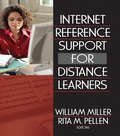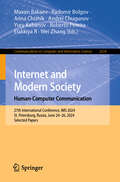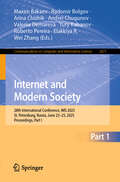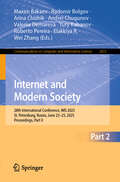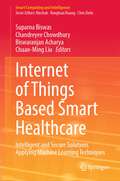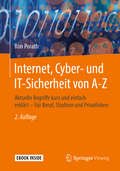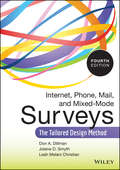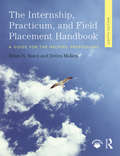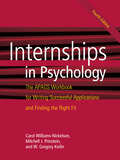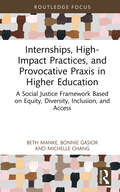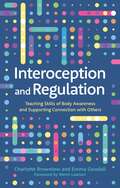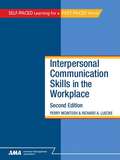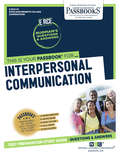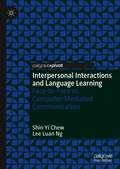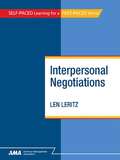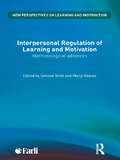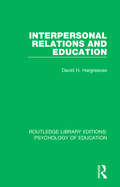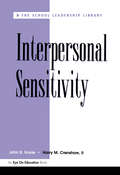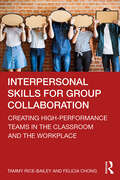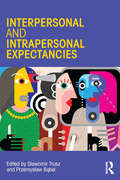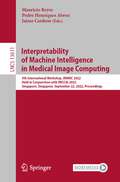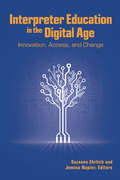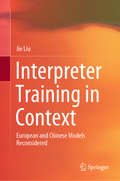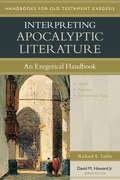- Table View
- List View
Internet Reference Support for Distance Learners
by William Miller Rita PellenMake separate library services for distance learners a thing of the past Internet Reference Support for Distance Learners takes a comprehensive look at efforts by librarians and information specialists to provide distance learners with effective services that match those already available on campus. With the development of the World Wide Web and the evolution of Web-based services, reference librarians are adding a human element to the virtual library, blurring the difference between distance learners and traditional users. This unique book examines how they deal with a wide range of related topics, including standards and guidelines, copyright issues, streaming media, and chat and digital references, and presents a historical overview of how reference and instructional services have been delivered to distance users-before and after the creation of the Internet.Internet Reference Support for Distance Learners reveals that librarians do not make a sharp distinction between reference and instruction within the context of distance learning, and that there is no clear boundary between "true" distance learners and more traditional students who might use services designed for nontraditional users. Online capabilities have allowed reference librarians to approximate services advocated by published guidelines and standards, including the ACRL Distance Learning Section&’s Guidelines for Distance Learning Library Services, to provide a framework for librarians to plan services for off-campus students.Internet Reference Support for Distance Learners provides practical information on: how librarians can "keep IT simple" when designing methods to access reference support why library Web sites are vital sources of communication between the distance learning student and the reference-based instructional component how to set up a university chat service, including software selection, staff training and assessment how to provide students services beyond traditional provision of resources, including advising, enrollment, and payment of fees how to create an online assistance site that incorporates online versions of traditional print handouts, FAQs, subject guides, course-specific guides, learning modules, and instructional videos in one central location how to work with faculty to create online support for students in Blackboard courses the pros and cons of using open-source software how to create an online library assistance site how to create online information literacy course to teach independent research skills to remote students how to avoid copyright infringement and how to educate library personnel about copyright law how to use Camtasia Studio, a screen capture program to create audio and video for online presentationsInternet Reference Support for Distance Learners is an invaluable resource for librarians working in academic, school, special, and public settings, and for library science faculty and students.
Internet and Modern Society. Human-Computer Communication: 27th International Conference, IMS 2024, St. Petersburg, Russia, June 24–26, 2024, Selected Papers (Communications in Computer and Information Science #2534)
by Wei Zhang Radomir Bolgov Yury Kabanov Roberto Pereira Andrei Chugunov Maxim Bakaev Elakkiya R Anna ChizhikThis book constitutes the proceedings of the 27th International Conference on Internet and Modern Society, IMS 2024, held in St. Petersburg, Russia, in June 24–26, 2024. The 29 full papers presented in this book were carefully reviewed and selected from 75 submissions. They are categorized into the following topical sections: • Computational Linguistics (CompLing) • Interactive Systems & Information Society Technologies (InterSys)
Internet and Modern Society: 28th International Conference, IMS 2025, St. Petersburg, Russia, June 23–25, 2025, Proceedings, Part I (Communications in Computer and Information Science #2671)
by Wei Zhang Radomir Bolgov Yury Kabanov Roberto Pereira Andrei Chugunov Maxim Bakaev Elakkiya R. Anna Chizhik Valeriia DemarevaThis two-set volume CCIS 2671 and 2672 book constitutes the proceedings of the 28th International Conference on Internet and Modern Society, IMS 2025, held in St. Petersburg, Russia, during June 23–25, 2025. The 44 full papers and 12 short papers included in these conference proceedings were carefully reviewed and selected from 135 submissions. They are categorized into the following topical sections: Part I: Computational Linguistics & Machine Learning (CompLing); Cyberpsychology & Post-AI Education (PsyAI); Digital Transformation in Governance and Society (DTGS). Part II: Art and Innovation in Museums (AIMs); Interactive Systems & Information Society Technologies (InterSys).
Internet and Modern Society: 28th International Conference, IMS 2025, St. Petersburg, Russia, June 23–25, 2025, Proceedings, Part II (Communications in Computer and Information Science #2672)
by Wei Zhang Radomir Bolgov Yury Kabanov Roberto Pereira Andrei Chugunov Maxim Bakaev Elakkiya R. Anna Chizhik Valeriia DemarevaThis two-set volume CCIS 2671 and 2672 book constitutes the proceedings of the 28th International Conference on Internet and Modern Society, IMS 2025, held in St. Petersburg, Russia, during June 23–25, 2025. The 56 full papers and 12 short papers included in these conference proceedings were carefully reviewed and selected from 104 submissions. They are categorized into the following topical sections: Part I: Computational Linguistics & Machine Learning (CompLing); Cyberpsychology & Post-AI Education (PsyAI); Digital Transformation in Governance and Society (DTGS). Part II: Art and Innovation in Museums; Interactive Systems & Information Society Technologies; Interactive Systems and Technologies in Biomedicine and Psychology; Interactive Systems and Technologies in Education and Humanities
Internet of Things Based Smart Healthcare: Intelligent and Secure Solutions Applying Machine Learning Techniques (Smart Computing and Intelligence)
by Chuan-Ming Liu Biswaranjan Acharya Chandreyee Chowdhury Suparna BiswasThis book provides both the developers and the users with an awareness of the challenges and opportunities of advancements in healthcare paradigm with the application and availability of advanced hardware, software, tools, technique or algorithm development stemming the Internet of Things. The book helps readers to bridge the gap in their three understanding of three major domains and their interconnections: Hardware tested and software APP development for data collection, intelligent protocols for analysis and knowledge extraction. Medical expertise to interpret extracted knowledge towards disease prediction or diagnosis and support. Security experts to ensure data correctness for precise advice. The book provides state-of-the-art overviews by active researchers, technically elaborating healthcare architectures/frameworks, protocols, algorithms, methodologies followed by experimental results and evaluation. Future direction and scope will be precisely documented for interested readers.
Internet, Cyber- und IT-Sicherheit von A-Z: Aktuelle Begriffe kurz und einfach erklärt – Für Beruf, Studium und Privatleben
by Ron PorathDie wichtigsten Begriffe zu Internet, Cyber-Risiken, IT-Sicherheit und Datenschutz. Kurz, aktuell, prägnant und einfach zu verstehen. Finden Sie hier schnell und ohne lange Texte lesen zu müssen die Bedeutung von aktuellen und in Zukunft wichtig werdenden Begriffen wie Blockchain, GDPR, Quantencomputer, WannaCry, Hacking, Ransomware oder Künstlicher Intelligenz. Dieses Standardwerk ist schnell zur Hand und darf heutzutage auf keinem Schreibtisch fehlen.
Internet, Phone, Mail, and Mixed-Mode Surveys: The Tailored Design Method
by Don A. Dillman Leah Melani Christian Jolene D. SmythThe classic survey design reference, updated for the digital age For over two decades, Dillman's classic text on survey design has aided both students and professionals in effectively planning and conducting mail, telephone, and, more recently, Internet surveys. The new edition is thoroughly updated and revised, and covers all aspects of survey research. It features expanded coverage of mobile phones, tablets, and the use of do-it-yourself surveys, and Dillman's unique Tailored Design Method is also thoroughly explained. This invaluable resource is crucial for any researcher seeking to increase response rates and obtain high-quality feedback from survey questions. Consistent with current emphasis on the visual and aural, the new edition is complemented by copious examples within the text and accompanying website. This heavily revised Fourth Edition includes: Strategies and tactics for determining the needs of a given survey, how to design it, and how to effectively administer it How and when to use mail, telephone, and Internet surveys to maximum advantage Proven techniques to increase response rates Guidance on how to obtain high-quality feedback from mail, electronic, and other self-administered surveys Direction on how to construct effective questionnaires, including considerations of layout The effects of sponsorship on the response rates of surveys Use of capabilities provided by newly mass-used media: interactivity, presentation of aural and visual stimuli. The Fourth Edition reintroduces the telephone—including coordinating land and mobile. Grounded in the best research, the book offers practical how-to guidelines and detailed examples for practitioners and students alike.
Internship, Practicum, and Field Placement Handbook: A Guide for the Helping Professions
by Brian N. Baird Debra MollenThe Internship, Practicum, and Field Placement Handbook is a practical guide for interns in the helping professions, with real-world knowledge of the skills students need through every phase of their practicum, field placement, or internship. This text expertly guides students through the essential skills needed for beginning work in the field of mental health and outlines skills that will serve students throughout their academic and professional careers. Skills discussed include how to make a great first impression, understanding the process and content of clinical writing, recordkeeping, working with peers and supervisors, understanding diversity, cultivating self-care, and promoting safety. Every phase of the internship is discussed chronologically: from finding and preparing for placements to concluding relationships with clients and supervisors. Following an evidence and competency-based approach, the latest research findings are reviewed from the fields of psychology, social work, and counseling. The Internship, Practicum, and Field Placement Handbook is an invaluable resource for students, faculty, and supervisors engaged in the exciting, challenging experience of transitioning from academia into clinical training in the field. Free online resources available at www.routledge.com/9781138478701 support the text.
Internships in Psychology: The APAGS Workbook for Writing Successful Applications and Finding the Right Fit
by Carol Williams-Nickelson PsyD Dr. Mitch Prinstein PhD Dr. W. Greg Keilin PhDThis authoritative, hands‑on book provides doctoral‑level psychology students with all the resources they need to successfully navigate the internship application process. Topics include the most common reasons why people don&’t secure a position; how many sites to apply to; rank ordering your list of programs; writing essays, cover letters, and your curriculum vitae; securing strong letters of recommendation; preparing for interviews; sending thank you notes; receiving Match results; and more. Since the third edition of this book was released, the online application process and the internship marketplace have undergone significant changes, such as the growing importance of accreditation. This fourth edition provides updated information that will help your applications stand out to your internship programs of choice. Advice is also offered to directors of clinical training so they can guide and support students during this challenging process. This resource is provided to students by the American Psychological Association of Graduate Students—the premier group committed to representing, leading, advocating, and developing resources for graduate psychology students.
Internships, High-Impact Practices, and Provocative Praxis in Higher Education: A Social Justice Framework Based on Equity, Diversity, Inclusion, and Access (Routledge Research in Higher Education)
by Beth Manke Bonnie Gasior Michelle ChangThis authored text critically examines the theory and practice of college internship programs grounded in equity, diversity, inclusion, and access (EDIA) to examine issues such as infrastructure, inclusion, and privilege through "provocative praxis," a form of provocative inquiry that drives the ethics of pedagogy to envision student success both equitably and sustainably. Chapters use real-life, scenario-based examples through a social-justice framework to engage readers and spark multi-directional discussion aimed at removing obstacles to equitable participation in internships for all students. Ultimately, this book offers a holistic understanding of internships that factors in the social, economic, and cultural challenges faced by college students today, and calls for wholescale reform to college campus internship programs.
Interoception and Regulation: Teaching Skills of Body Awareness and Supporting Connection with Others
by Emma Goodall Charlotte BrownlowThere are some things that many of us take for granted - such as knowing when we are hot or cold, feel hungry, or need to go to the toilet. But how do we know these things, and why do some people struggle to recognise them? Interoception - the ability to identify and act on physical sensations inside the body - is crucial to human well-being. It underpins physical developmental milestones, such as toilet-training, as well emotional ones, such as the ability to self-regulate. Research shows that Autism often co-occurs with poor interoceptive sense.This practical and informative book demystifies interoception and provides tools to help boost interoceptive abilities. It summarises the latest research, explores how interoceptive difficulties can be identified, suggests strategies to manage feelings and emotions, and explains how to support individuals in 'tuning in' to themselves.
Interpersonal Communication Skills in the Workplace, Second Edition
by Perry Mcintosh Richard Luecke Jeffery H. DavisEffective communication is an important element of success for every organization, leader, manager, supervisor, and employee. Good communication skills are a prerequisite for advancement in most fields and are key to exercising influence both within and beyond the work group. This edition retains the subject matter strengths of the previous version and augments them with content that reflects new understandings of interpersonal communications, new communication technologies, and new organizational practices that include wider spans of management control, greater employee empowerment, geographically dispersed work groups, and team-based activities. It also contains new material on persuasive communications, dialogue, and nominal group technique. New chapters on techniques for generating ideas and solutions and communicating in the multicultural workplace offer fresh perspectives on topics that have become increasingly important in today’s workplace. Throughout the book, the authors provide assessments, exercises, and Think About It sections that offer readers numerous opportunities for practice and feedback. Any person can realize the benefits of improved communication skills. Interpersonal Communication Skills in the Workplace, Second Edition, provides the insight and expertise needed to achieve this goal. Readers will learn how to: * Solve common communication problems. * Communicate with different personality types. * Read non-verbal cues. * Improve listening skills. * Give effective feedback. * Be sensitive to cultural differences in communication.
Interpersonal Communication: Passbooks Study Guide (Excelsior/Regents College Examination Series)
by National Learning CorporationThe Excelsior/Regents College Examinations (E/RCE) offer you an opportunity to obtain recognition for college-level learning and consists of exams designed to demonstrate achievement and mastery of various college-level subjects, such as the Arts and Sciences, Business, Criminal Justice, Education, Health and Nursing. The E/RCE Interpersonal Communication Passbook® prepares you by sharpening knowledge of the skills and concepts necessary to succeed on the upcoming exam and the college courses that follow. It provides a series of informational texts as well as hundreds of questions and answers in the areas that will likely be covered on your upcoming exam.
Interpersonal Interactions and Language Learning: Face-to-Face vs. Computer-Mediated Communication
by Shin Yi Chew Lee Luan NgThis book takes as its starting point the assumption that interpersonal communication is a crucial aspect of successful language learning. Following an examination of different communicative models, the authors focus on traditional face-to-face (F2F) interactions, before going on to compare these with the forms of computer-mediated communication (CMC) enabled by recent developments in educational technology. They also address the question of individual differences, particularly learners' preferred participation styles, and explore how F2F and CMC formats might impact learners differently. This book will be of interest to students and scholars of computer-mediated communication (CMC), computer-assisted language learning (CALL), technology-enhanced language learning (TELL), language acquisition and language education more broadly.
Interpersonal Negotiations Breaking Down the Barriers
by Len LeritzFinally…a negotiation framework that encourages a positive outcome for both parties. This book takes the "win/win" concept a step further to make negotiating a more gratifying experience—even if you don’t get exactly what you want. Interpersonal Negotiations: Breaking Down the Barriers builds on mutual understanding and respect for each other's needs and provides a proven framework for fulfilling them. You’ll discover the secrets that can help turn an adversary into an advocate. You will learn how to: • Ensure a safe, fair, and effective negotiation process • Direct the negotiation process to create mutual understanding and acceptance • Recognize and understand your own needs and those of the other person • Make it easy for others to understand your needs • Be creative and persistent to address and resolve blocks to successful negotiation • Assess the other person's behavioral and emotional responses • Acknowledge your own and the other person's perceptions and beliefs • Avoid getting mired in the process
Interpersonal Regulation of Learning and Motivation: Methodological Advances (New Perspectives on Learning and Instruction)
by Simone Volet Marja VaurasInterpersonal Regulation of Learning and Motivation is the first book in the field to focus on major methodological advances in research on interpersonal regulation of learning and motivation. Interest in developing ways of capturing the dynamics of interpersonal regulation in real-life learning interactions is growing rapidly. Understanding these dynamics is particularly timely given the increased use of collaborative learning activities in schools and university settings, as well as through face-to-face and computer supported collaborative learning (CSCL) environments. While groups and collections of individuals in social interaction are expected to bring their own motivations and goals to the learning situations, it is also assumed that these are further shaped through interaction, as the group activity evolves. Research methodology publications in the field of learning, regulation and motivation are still dominated by a focus on the individual. The study of collaborative learning at both conceptual and methodological level has not incorporated the significance of social regulatory processes of learning and motivation. This is a new development in the field and one covered by this book. The book contains numerous illustrations of innovative: Methodological approaches to study and interpret the dynamics of interpersonal regulation Data sources and data representations to capture scaffolded instruction Theory-based analytic methods to investigate interactions in real-life collaborative learning Coding systems and social software tools for gathering and analysing interactive data. Interpersonal Regulation of Learning and Motivation brings together the work of scholars who have been studying interpersonal regulation of learning and motivation at the boundaries of the individual and the social, and who have made original methodological contributions to the study of interactive learning environments. In combination, their work provides a range of distinctive and original conceptual and methodological contributions to this under-examined and vital field of research, making this an essential read for any researcher or student interested in collaborative learning and motivation.
Interpersonal Relations and Education (Routledge Library Editions: Psychology of Education)
by David H. HargreavesOriginally published in 1972, this title provides an analysis of social interactions in educational contexts and opens up the field of the social psychology of education as an area in its own right at the very heart of the process of education. From a ‘symbolic interactionist’ perspective, the author develops a framework for the study of relations between teachers and pupils, discussing the basic ways of analysing social interaction, including the concepts of perception and role. He examines the distinctive perspectives of teachers and pupils on their relationships, bringing together into a coherent framework the insights of such writers as John Holt and Carl Rogers, and within this context he explores the notion of ‘voluntary schooling’. The book also deals with other important aspects of education such as discipline, classroom group dynamics and the relations between headteachers and their staff. The theories put forward by the author are firmly grounded in the daily experience of teachers and pupils in the classroom at the time. The book was expected to be of value to experienced teachers and student teachers alike, as well as to teachers of the social sciences in general.
Interpersonal Sensitivity
by Harry Crenshaw John HoyleThrough case studies, practical activities, and common sense explanations, this book shows that interpersonal sensitivity must be developed if a school is going to succeed.
Interpersonal Skills for Group Collaboration: Creating High-Performance Teams in the Classroom and the Workplace
by Tammy Rice-Bailey Felicia ChongThis lively and engaging text introduces readers to the core interpersonal and organizational skills needed to effectively collaborate on group projects in the classroom and the workplace. Group projects are critical in preparing students for the realities of today’s workplace, but many college students despise group work—often because they have not been prepared with the necessary skills to effectively collaborate. This guide teaches core collaboration skills such as active listening, interviewing, empathy, and conflict resolution. It examines the research and theory behind these skills, and provides tangible ways to practice these skills both alone and in groups. This guide can be used a supplementary text for any courses involving group projects, and will also be of interest to professionals in communication, business, and many other fields.
Interpersonal and Intrapersonal Expectancies
by Sławomir Trusz Przemysław BąbelDo our expectancies about ourselves and about others have any effect on our actual experiences? Over fifty years of research studies suggest not only that this is the case, but also that our expectancies can shape other people’s experience in different contexts. In some cases they can help, but other times they can do harm instead. Interpersonal and Intrapersonal Expectancies provides a theory, a research review, and a summary of the current knowledge on intra- and interpersonal expectancy effects and related phenomena. Based on extensive study, and written by eminent experts from some of the world’s leading academic institutions, the book presents the most recent knowledge on social and psychological mechanisms of forming both intra- and interpersonal expectancies. It also considers how expectancies are sustained and what their consequences are, as well as discussing the latest theoretical concepts and the most up-to-date research on expectancy effects. This book represents the first review of the phenomenon of interpersonal expectancies in over 20 years, and the only publication presenting a complementary view of both intra- and interpersonal expectancies. It aims to open up a discussion between researchers and theoreticians from both perspectives, and to promote an integrative approach that incorporates both.
Interplay between Metal Ions and Nucleic Acids
by Astrid Sigel Roland Ko Sigel Helmut SigelInterplay between Metal Ions and Nucleic Acids provides in an authoritative and timely manner in 12 stimulating chapters, written by 24 internationally recognized experts from 8 nations, and supported by nearly 1500 references, about 20 tables, and 125 illustrations, many in color, a most up-to-date view on metal ion-nucleic acid interactions; the characterization of which is covered in solution and in the solid state. The volume concentrates on modern developments encompassing topics in the wide range from G-quadruplexes via DNAzymes, catalysis at the DNA scaffold, and metal-mediated base pairs to peptide nucleic acids (PNAs) being thus of relevance, e.g., for chemistry and nanotechnology but also for molecular biology and (genetic) diagnostics.
Interpretability of Machine Intelligence in Medical Image Computing: 5th International Workshop, iMIMIC 2022, Held in Conjunction with MICCAI 2022, Singapore, Singapore, September 22, 2022, Proceedings (Lecture Notes in Computer Science #13611)
by Jaime Cardoso Mauricio Reyes Pedro Henriques AbreuThis book constitutes the refereed joint proceedings of the 5th International Workshop on Interpretability of Machine Intelligence in Medical Image Computing, iMIMIC 2022, held in September 2022, in conjunction with the 25th International Conference on Medical Imaging and Computer-Assisted Intervention, MICCAI 2022.The 10 full papers presented at iMIMIC 2022 were carefully reviewed and selected from 24 submissions each. The iMIMIC papers focus on introducing the challenges and opportunities related to the topic of interpretability of machine learning systems in the context of medical imaging and computer assisted intervention.
Interpreter Education in the Digital Age: Innovation, Access, and Change
by Jemina Napier Suzanne EhrlichThis collection brings together innovative research and approaches for blended learning using digital technology in interpreter education for signed and spoken languages. Volume editors Suzanne Ehrlich and Jemina Napier call upon the expertise of 21 experts, including themselves, to report on the current technology used to provide digital enhancements to interpreter education in Australia, New Zealand, Brazil, Belgium, the United Kingdom, and the United States. Divided into three parts, Innovation, Change, and Community Engagement, this study focuses on the technology itself, rather than how technology enhances curriculum, delivery, or resources. Initiatives described in this collection range from the implementation of on-demand interpreting using iPad technology to create personalized, small-group, multidimensional models suited to digital media for 160 languages; introducing students to interpreting in a 3D world through an IVY virtual environment; applying gaming principles to interpreter education; assessing the amenability of the digital pen in the hybrid mode of interpreting; developing multimedia content for both open access and structured interpreter education environments; to preparing interpreting students for interactions in social media forums, and more. Interpreter Education in the Digital Age provides a context for the application of technologies in interpreter education from an international viewpoint across languages and modalities.
Interpreter Training in Context: European and Chinese Models Reconsidered
by Jie LiuThis book addresses an important, yet under-researched domain in interpreting education: how theoretical training models should be responsive to context. To do so, it applies the linguistic concept of ‘context’ to interpreting studies by investigating practices in representative (conference) interpreting training programmes in Europe and China. After presenting an overview of interpreter training programmes, the author describes the need to reassess the applicability of the well-established and widely accepted model of interpreting from the Paris School (ESIT/AIIC model) to the Chinese interpreting training scene.Building on the theoretical study of context in foreign language classrooms suggested by linguists like Halliday and Hasan (1993); Kramsch (1993) and others, the author subsequently constructs a new curriculum, comprising a four-step approach to consecutive interpreting courses in the Chinese context. The rationale for such an approach is justified in accordance with the overall design of context, taking into account the four dimensions in a teaching–learning environment.This book is intended for scholars and graduate students who are interested in translation and interpreting, applied linguistics as well as foreign language education. It also serves as a practical guide for developing (university-level) translation and interpreting programmes.
Interpreting Apocalyptic Literature: An Exegetical Handbook (Handbooks for Old Testament Exegesis)
by Richard A. TaylorAn appreciation for the rich diversity of literary genres in Scripture is one of the positive features of evangelical scholarship in recent decades.—-David M. Howard Jr., series editorAt one time, Old Testament apocalyptic literature was relegated to the more obscure reaches of biblical scholarship, acceptable to occasionally refer to, but too thorny to delve into deeply. However, in recent decades it has moved to the forefront of research. The rich veins of insight to be mined in the book of Daniel and other apocalyptic texts are being rediscovered. Richard A. Taylor has crafted a handbook to explore those riches and uncover a way to understand apocalyptic literature more fully.Taylor begins with a helpful introduction to the genre; surveys the purpose, message, and primary themes of Old Testament apocalyptic literature; and then discusses critical questions and key works for further study. He also provides guidelines for interpreting apocalyptic texts, followed by Old Testament passages that serve to illustrate those guidelines.While primarily written for pastors and graduate students, Interpreting Apocalyptic Literature is nonetheless accessible to those who simply want to study the texts more deeply than previously possible.
